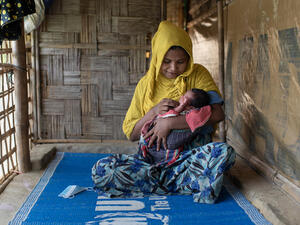Rohingya emergency one year on: Asia's most recent refugee crisis warrants international solidarity and progress on solutions
Rohingya emergency one year on: Asia's most recent refugee crisis warrants international solidarity and progress on solutions

Hamida, 22, (center) and her son Mohammed, aged one, wait to receive food aid along with hundreds of other Rohingya refugees, at Kutupalong Refugee Camp, in Bangladesh.
UNHCR, the UN refugee agency, is calling today on the international community to step up its support for some 900,000 stateless Rohingya refugees in Bangladesh and show solidarity with their generous hosts. The collective international responsibility for protecting and finding solutions for these refugees must remain a priority for all countries in the region and beyond.
Since August last year, more than 720,000 stateless Rohingya refugees, fleeing violence and systemic discrimination in Myanmar’s Rakhine State, have found shelter and safety in Cox’s Bazar district of Bangladesh. There they joined an estimated 200,000 Rohingya refugees from previous waves of displacement.
At the onset of the emergency, UNHCR immediately deployed additional staff to Bangladesh and airlifted more than 1,500 metric tonnes of aid and relief items. More aid was and continues to be shipped and moved by land. Over the past year our teams have been working around the clock in support of Bangladeshi authorities to ensure that the refugees are protected. Our work includes psycho-social counselling, prevention of sexual and gender based violence, family counting, identification of and assistance to separated and unaccompanied children and other vulnerable refugees.
Kutupalong settlement in Cox’s Bazar shelters today more than 600,000 refugees, making it the largest and most densely populated refugee settlement in the world. This brings daily challenges of delivering shelter, water and sanitation and access to basic services, as well as protection considerations such as the safety of women and girls.
In a dramatic race against time, intense preparations have been undertaken over the last few months to ready the refugee settlements to face the heavy monsoon rains. Massive engineering works have been implemented to help reduce the risk of landslides and flooding. Hundreds of refugee volunteers have been mobilized and trained to serve as first responders in the event of a natural disaster. These efforts have proved invaluable during the unprecedented rains in June and July, as the refugee settlements largely withstood the adverse weather.
As we take stock of what has been achieved so far, UNHCR urges renewed international engagement and support for refugees and host communities in Bangladesh, in order to expand the response from day-to-day lifesaving operations to also address challenges such as education and self-reliance for the Rohingya refugees. Repairing the environmental impact of hosting hundreds of thousands of refugees in the Cox’s Bazar area also requires urgent action, including through reforestation and use of alternative fuels for cooking and heating. This week we began distribution of liquid petroleum gas (LPG) to the first 7,000 refugee households. UNHCR plans to deliver this new fuel to 100,000 households (approximately 500,000 refugees) by the end of the year.
The Joint Response Plan (JRP) launched in March 2018 appealed for US$ 950.8 m for the period from March to December 2018. As of mid-August the JRP is just over 33 per cent funded. This is deeply worrying given that we are nearing the last four months of 2018. It is vital that humanitarian agencies receive early and flexible funding in order to continue delivering lifesaving assistance and to improve the living conditions for refugees and host communities in Bangladesh.
Against this backdrop, it is vital not to lose sight of the fact that the solutions to this crisis lie in Myanmar. International support is needed to assist the Government of Myanmar to address the root causes of the crisis, in line with the recommendations of the Advisory Commission on Rakhine State led by late Kofi Annan. This should include ensuring freedom of movement for all people in Rakhine State, irrespective of ethnicity, religion or citizenship status, and a clear and voluntary pathway to citizenship. The willingness of the Myanmar authorities to take the lead in this process is critical.
For more information on this topic, please contact:
- In Cox’s Bazar, Caroline Gluck, [email protected], +880 1872 699 849
- In Cox’s Bazar, Firas Al-Khateeb, [email protected], +880 1885 934 309
- In Bangkok, Keane Shum, [email protected], +66 92 275 2585
- In Yangon: Aoife MC Donnell [email protected], +962 7 9545 0379
- In Geneva, Andrej Mahecic, [email protected], +41 79 642 9709









